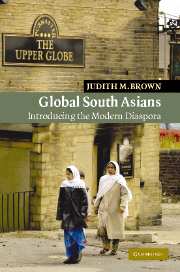4 - Relating to the new homeland
Published online by Cambridge University Press: 05 June 2012
Summary
This chapter shifts our discussion of the South Asian diaspora from the complex processes of putting down roots and establishing new homes and communities, to the way South Asians relate to the state and society in the places where they have made their homes outside the subcontinent. As this new relationship with a new homeland is forged over time, both onetime immigrants and the host societies acknowledge that South Asians are permanent residents and citizens in their new homes, particularly as their children and grandchildren grow up in the diaspora, knowing no other homeland. The approach is again thematic, as I highlight central issues rather than attempting any total history of the many elements in the diaspora. What becomes clear is that there is still much research to be done on the detail of how many of these issues are worked out in the very diverse strands of the diaspora. In general there is less evidence on the older South Asian communities overseas and more relating to those areas where South Asians have more recently migrated to modern states with developed economies and a much larger commitment to greater knowledge of their citizens, and provision of state services for them. Reflecting this understanding of the appropriate relationship of state and society it is striking, in relation to Britain for example, how scholars and researchers from so many different disciplines, as well as from government agencies, have felt a need to understand the dynamics and problems of South Asian groups in contemporary society: they include historians, political scientists, sociologists, geographers, health professionals and people interested in remedying profound inequalities.
- Type
- Chapter
- Information
- Global South AsiansIntroducing the modern Diaspora, pp. 112 - 148Publisher: Cambridge University PressPrint publication year: 2006



